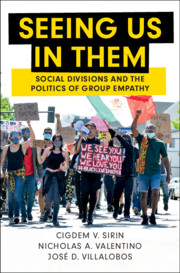Book contents
- Seeing Us in Them
- Cambridge Studies in Public Opinion and Political Psychology
- Seeing Us in Them
- Copyright page
- Dedication
- Contents
- Figures
- Tables
- Prologue
- 1 The Puzzle
- 2 Group Empathy Theory
- 3 Measuring Group Empathy
- 4 An Origin Story
- 5 Group Empathy and Homeland Security
- 6 Group Empathy and the Politics of Immigration
- 7 Group Empathy and Foreign Policy
- 8 Group Empathy in the Era of Trump
- 9 Group Empathy, Brexit, and Public Opinion in the United Kingdom
- 10 Cultivating Group Empathy and Challenging Ethnonationalist Politics
- Epilogue Group Empathy in Response to the COVID-19 Pandemic
- References
- Index
- Books in the series
10 - Cultivating Group Empathy and Challenging Ethnonationalist Politics
Published online by Cambridge University Press: 11 March 2021
- Seeing Us in Them
- Cambridge Studies in Public Opinion and Political Psychology
- Seeing Us in Them
- Copyright page
- Dedication
- Contents
- Figures
- Tables
- Prologue
- 1 The Puzzle
- 2 Group Empathy Theory
- 3 Measuring Group Empathy
- 4 An Origin Story
- 5 Group Empathy and Homeland Security
- 6 Group Empathy and the Politics of Immigration
- 7 Group Empathy and Foreign Policy
- 8 Group Empathy in the Era of Trump
- 9 Group Empathy, Brexit, and Public Opinion in the United Kingdom
- 10 Cultivating Group Empathy and Challenging Ethnonationalist Politics
- Epilogue Group Empathy in Response to the COVID-19 Pandemic
- References
- Index
- Books in the series
Summary
Chapter 10 provides an overview of all our findings and offers additional avenues of research. We also discuss the many policy implications and political ramifications of group empathy, including what happens when it is lacking in specific contexts. In doing so, we consider the rise of ethnonationalist, far-right politics in the United States and many other parts of the world, and we discuss whether group empathy may counteract xenophobic, exclusionary appeals of populist leaders. The eight-year span of our data collection covers a stark transformation of the American policy landscape as the United States transitioned from Barack Obama’s presidency to Donald Trump’s. This allows us to contemplate how levels of group empathy might have shifted over time within and across racial/ethnic groups in the United States. We further consider how to cultivate group empathy at the societal level, in order to improve intergroup relations and social justice, and how to envision the role of educational experiences such as community engagement in these efforts.
Keywords
- Type
- Chapter
- Information
- Seeing Us in ThemSocial Divisions and the Politics of Group Empathy, pp. 231 - 259Publisher: Cambridge University PressPrint publication year: 2021

